|
|
|
Sort Order |
|
|
|
Items / Page
|
|
|
|
|
|
|
| Srl | Item |
| 1 |
ID:
173437
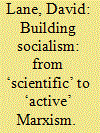

|
|
|
|
|
| Summary/Abstract |
Historical materialism envisages law-like tendencies (‘scientific’ Marxism) promoting the development of productive forces and, concurrently, a political praxis (‘active’ Marxism) requiring human intervention. These positions give rise to conflicting interpretations of Marxism: first to understand society, second to change it – to abolish economic exploitation. The twentieth century witnessed a shift in the locus of the contradictions of capitalism to the economically dependent territories of the imperial powers. Socialist parties, when in power and adopting a Leninist political praxis, furthered modernisation and were successful in reducing economic exploitation. The paper addresses the relationship between the scientific and praxis components of Marxism in contemporary global capitalism. It considers post-Marxist interpretations of the changing class structure, the rise of identity politics and the evolving nature of capital. Forms of domination, oppression and discrimination (bureaucracy, patriarchy, racism, militarism and credentialism) give rise to their own distinctive forms of power relations. It is contended that they should not be equated with Marx’s crucial insight into the nature of economic exploitation. Many current Marxist (and ‘post-Marxist’) writers adopt a ‘scientific’ position emphasising the inherent contradictions of capitalism. The author claims that without appropriate political praxis, the resolution of such contradictions is unlikely to transcend capitalism.
|
|
|
|
|
|
|
|
|
|
|
|
|
|
|
|
| 2 |
ID:
173443
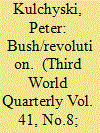

|
|
|
|
|
| Summary/Abstract |
This article argues that bush people deserve greater attention in revolutionary thought and action, both for the strategic value of their struggles against extraction at capital’s periphery and the emancipatory social values they continue to embody. But bush struggles cannot be borrowed for other purposes: the agenda of bush people for respect and cultural survival must respected in its own right.
|
|
|
|
|
|
|
|
|
|
|
|
|
|
|
|
| 3 |
ID:
173439


|
|
|
|
|
| Summary/Abstract |
This article is an intervention in some controversies concerning the role of the Communist International in and outside China. It seeks to tackle the inappropriate denial of its guidance and aid to the Chinese Revolution. In doing so, this paper makes several arguments. First, it argues that the Communist International provided the Chinese Revolution with valuable guidance, support and assistance. These contributed tremendously to the Communist Party of China’s birth, development, consolidation and maturation and advanced its theoretical self-consciousness. Second, while the Communist International gave its guidance in the sincere hope that the Chinese Revolution would benefit from correct theories and advanced experiences, it absolutised the theoretical conceptions of the classical Marxists and the Russian experience. This led to mistakes or misjudgments that deserve an accurate evaluation. Third, the Communist International was itself conducting theoretical exploration, and was generally able to adjust its own theories and change its strategies. Fourth, for all the Communist International’s guidance, the universal tenets of Marxism had to be integrated with the concrete practice of the Chinese Revolution, and it was the ability of Chinese communists to Sinicise Marxism–Leninism in what amounted to a theoretical revolution under Mao Zedong’s leadership that accounts for the revolution’s ultimate victory.
|
|
|
|
|
|
|
|
|
|
|
|
|
|
|
|
| 4 |
ID:
173436
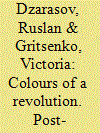

|
|
|
|
|
| Summary/Abstract |
The Ukraine crisis is usually treated either as Russia’s return to the old-style empire-building (the right) or as a clash of two imperialisms (the left). However, the essence of this crisis can be understood only from the dual perspective of the consequences of the Stalinist degeneration of the Russian Revolution and the fate of the modern global capitalism. The most rotten sections of the Soviet bureaucracy moved the society to capitalism. However, this effort could secure only a peripheral (Ukraine) or at best semi-peripheral (Russia) position in the capitalist world-system as a provider of cheap raw materials. Meanwhile, modern capitalism led to world economic crisis. In these conditions, the capital of the core capitalist countries obviously decided to strengthen its control over the periphery, and Russia’s aspirations to secure its domination over the former Soviet space were in the way. To thwart them, Western powers decided to provoke a Ukraine crisis, exploiting Ukrainians’ justified indignation at the backwardness and corruption inherent in their own peripheral capitalism. Hence, a study of the properties of the post-Soviet societies and their place in the world hierarchy is the key to understanding the Ukraine crisis.
|
|
|
|
|
|
|
|
|
|
|
|
|
|
|
|
| 5 |
ID:
173444
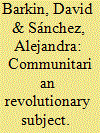

|
|
|
|
|
| Summary/Abstract |
The hope for a unique revolutionary actor in the twentieth century evaporated as a result of the weaknesses of social organisations. This paper examines the potential of an almost-forgotten group of revolutionary actors – collectively organised and deliberately involved in processes of social and productive transformation with a legitimate claim to territory – whose present-day activities involve them in concerted processes to consolidate a different constellation of societies on the margins of the global capitalist system. Indigenous and peasant communities throughout the Americas are self-consciously restructuring their organisations and governance structures, taking control of territories they claimed for generations. They are also reorganising production to generate surplus, assembling their members to take advantage of underutilised resources and peoples’ energies for improving their ability to raise living standards and assure environmental conservation and restoration. These communities are not operating in isolation. They coordinate activities, share information and build alliances. Hundreds of millions of people are participating in this growing movement; they occupy much more than one-quarter of the world’s land area. There is great potential for others to join them, expanding from the substantial areas where they are already operational. Global social networks are ensuring that this dynamic accelerates.
|
|
|
|
|
|
|
|
|
|
|
|
|
|
|
|
| 6 |
ID:
173441
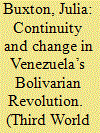

|
|
|
|
|
| Summary/Abstract |
The aims and outcomes of the Bolivarian Revolution in Venezuela are fiercely contested. A sympathetic view sees the possibility of Left revolutionary transformation as destabilised by aggressive US and domestic opposition actions. Detractors trace an authoritarian path from President Hugo Chávez’s election in 1998 to an inevitable socialist implosion under his successor Nicolás Maduro two decades later. This article emphasises continuities between the Bolivarian Fifth Republic and the Fourth Republic that the Revolution displaced. These account for the limitations of the transformative process. Historical institutionalism explains the reproduction of rentier practices and centralised state management and political organisation, culminating in cascading crisis across regime types.
|
|
|
|
|
|
|
|
|
|
|
|
|
|
|
|
| 7 |
ID:
173438
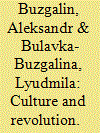

|
|
|
|
|
| Summary/Abstract |
The article shows the dialectic of the relationship of revolution and culture as two sides of creativity - social and art. In a dialogue with the philosophy of Mikhail Bakhtin, the authors reveal culture as the removal of alienation (disalienation) in the process of subject-subjective dialogue, in which a qualitatively new reality is created – Truth, Beauty, Good, a new person is born - a man-creator, and as such, culture is revolutionary. The second side of this connection - the revolution as a culture - is revealed by the authors on the example of the social creativity of revolutionary Russia, the poet of which was Vladimir Mayakovsky. The article gives a panorama of the historical practices of art and social creativity of the 1920s. The authors show that the counterpoint to these practices was the relationship of conformism, bureaucracy and other forms of social alienation which led the Soviet project to the dead end. The authors conclude that disalienation in the social and cultural spheres is possible only to the extent that the sociopolitical revolutionary changes are carried out in unity with the liberation of the cultural potential of the masses, and art creativity is interfaced (united) with social creativity.
|
|
|
|
|
|
|
|
|
|
|
|
|
|
|
|
| 8 |
ID:
173445
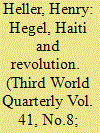

|
|
|
|
|
| Summary/Abstract |
Susan Buck-Morss’s argument that the Haitian Revolution embodied the most universal aspect of the French Revolution, namely the quest for universal freedom, relies on the supposed references to Haiti in the master–slave dialogue in Hegel’s Phenomenology of Spirit. The revolution’s lodgement at the core of this foundational text of Enlightenment universalism is, for her, about as convincing a demonstration as one can have of the universal significance of the Haitian Revolution. Marxists have opposed her venture, and demonstrated their hostility to post-colonial thinking, principally by claiming that the master–slave is an expression of European class conflict. This paper agrees with Buck-Morss that the Haitian Revolution critically affirmed the principle of universal freedom and, indeed, pushed the revolution in France and Europe in a radical direction. A better affirmation of the universal significance of the Haitian Revolution than the thoughts of Hegel is possible. The latter do not actually provide such affirmation, because racism, Eurocentrism and a hostility to political radicalism are fundamental aspects of Hegel’s thought. The alternative affirmation can be found in Marxist analysis. This paper outlines such an analysis, and concludes that post-colonialism of Buck-Morss’s sort is no substitute for the perspective provided by historical materialism.
|
|
|
|
|
|
|
|
|
|
|
|
|
|
|
|
| 9 |
ID:
173440
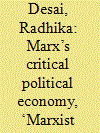

|
|
|
|
|
| Summary/Abstract |
Most revolutions against capitalism have occurred in ‘backward’ and Third World societies, and they have divided and disarrayed Marxisms in the West. One key reason, this paper argues, is intellectual. When, long ago, Marxists surrendered to the bourgeois challenge to Marx – neoclassical economics – developing, in place of Marx’s critical political economy, a ‘Marxist economics’, they lost touch with Marx’s analysis of capitalism as contradictory value production. That analysis could illuminate how capitalism’s contradictions drive its imperialist expansionism and how and why resistance to it must, equally necessarily, take national forms. As a result, major currents of Marxism in the West either have paid attention to imperialism and anti-imperialist resistance but without Marx’s analysis of capitalism as contradictory value production or have insisted that their (mistaken) conception of Marx’s analysis implies that capitalism has no necessary connection with imperialism. Neither tradition can actually develop Marxism to comprehend the actual historical record of revolutions since Marx’s time. Neither can inform new mobilisations against capitalism, whether in or outside its homelands. It is high time we return to Marx’s analysis of capitalism as value production and develop it.
|
|
|
|
|
|
|
|
|
|
|
|
|
|
|
|
| 10 |
ID:
173442


|
|
|
|
|
| Summary/Abstract |
One key marker of mass social movements transitioning to participatory democratic governance is popular media access. This essay argues that democratic media access by public constituencies becomes a site for constructing social revolution and simultaneously a manifest empirical measure of the extent of democratic participation in the production, distribution, and use of communication with new cultural possibilities. The participatory production practices (with citizens producing and hosting their own programs) and the democratic content (of oral histories, local issues, critiques of government and business, and everyday vernacular) reflect the hegemony of emerging ‘Bolivarian’ twenty-first century socialism expressed as popular participation in media production. Bolstered by constitutional changes and public funding, popular social movements of civil society, indigenous, women, and working class organizations have gained revolutionary ground by securing in practice the right of media production. Findings indicate that public and community media (that move beyond alternative sites of local expression and concerns) provide a startling revolutionary contrast to the commercial media operations in every nation. Popular media constructions suggest a new radically democratic cultural hegemony based on human solidarity with collective, participatory decision-making and cooperation offering real possibilities and experiences for increased equality and social justice.
|
|
|
|
|
|
|
|
|
|
|
|
|
|
|
|
| 11 |
ID:
173434
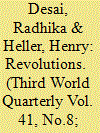

|
|
|
|
|
| Summary/Abstract |
We held the ‘Revolutions’ conference in 2017 to commemorate the Russian Revolution and redeem the actual record of revolutions in the Third World for the left. A quarter-century after the demise of the USSR, we found liberal capitalist triumphalism unwarranted. Two of the most important expectations to which it gave rise – that the world had become ‘unipolar’ and that it would enjoy a ‘peace dividend’ – remained unfulfilled. Instead, the world became multipolar and the West, led by the United States, engaged in unprecedented economic and military aggression against countries that contested its power. If this were not enough, social unrest and explosions in the First World as well as the Third underlined the relevance of revolutions. To trace their lineage, we recall capitalism’s intimate relation with revolution. It has needed revolutions to usher it into history and to usher it out. In addition to revolutions against developed capitalism, we also underline how important and necessary revolutions against nascent capitalism in various parts of the world have been. The contributions in this volume explore different parts of this lineage and vivify revolutions for our time.
|
|
|
|
|
|
|
|
|
|
|
|
|
|
|
|
| 12 |
ID:
173435


|
|
|
|
|
| Summary/Abstract |
The Russian Revolution is analysed in this paper in the context of a conjuncture dominated by counterrevolution. Beginning with the repression of the 1850s, a process of permanent counterrevolution has become the over-determining trend of social-political history. The Russian Revolution was subject to several distinct aspects of this process. First was external counterrevolution, the attack on it from the outside. Whilst Anglo-America was the main bulwark organising it, the Nazi/fascist counterrevolution and invasion of the USSR was an example of counterrevolution that ran out of control and ended in a defeat in Europe that was only overcome through a long and risky Cold War. Internal counterrevolution affected the Russian Revolution as part of a longer process of adjusting socialist theory to successive defeats. In the Soviet case, Socialism in One Country was the decisive mutation in this respect and must be viewed as the decisive component of the triumph of counterrevolution. After the war, Anglo-America adjusted the counterrevolutionary strategy to surgical excisions of socialist tendencies until the USSR, isolated and ideologically exhausted, collapsed. Even so, several of its legacies continue to be relevant, notably the nationality policy and internationalism. Also, today’s information revolution casts a new light on the Soviet planning experience that must be studied now that capitalism is slipping into a systemic crisis.
|
|
|
|
|
|
|
|
|
|
|
|
|
|
|
|
|
|
|
|
|